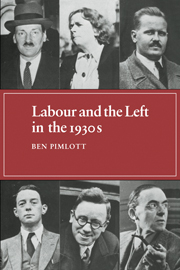Book contents
- Frontmatter
- Contents
- Dedication
- Acknowledgements
- Glossary of initials
- 1 Introduction
- PART ONE LABOUR AND THE CRISIS
- 2 Watershed
- 3 Leadership
- 4 Fabians and Keynesians
- 5 Labour and the Left: the Socialist League
- 6 Radicalism or Socialism?
- PART TWO UNITED FRONT
- PART THREE RANK AND FILE
- PART FOUR ALLIANCE
- Appendix
- Notes
- Bibliography
- Index
- Frontmatter
- Contents
- Dedication
- Acknowledgements
- Glossary of initials
- 1 Introduction
- PART ONE LABOUR AND THE CRISIS
- 2 Watershed
- 3 Leadership
- 4 Fabians and Keynesians
- 5 Labour and the Left: the Socialist League
- 6 Radicalism or Socialism?
- PART TWO UNITED FRONT
- PART THREE RANK AND FILE
- PART FOUR ALLIANCE
- Appendix
- Notes
- Bibliography
- Index
Summary
A major effect of the 1931 election was to move the most prominent of those in the PLP who survived it suddenly to the forefront, and, among those who were defeated to give younger, brighter men unexpected influence. The party hierarchy was turned upside down. It was not just that most of the older leaders who had not deserted to the other side had lost their seats. Within the space of a few months, almost all had ceased to be central figures in the Labour Party.
Sir Charles Trevelyan retired to manage his huge estates in Northumberland; Tom Johnston returned to Scotland; Margaret Bondfield went back to the NUGMW as a full-time official; Willie Adamson was taken back as a miners’ official. William Graham – formerly President of the Board of Trade and widely regarded as one of the most promising of the younger ministers – fell victim to the combined shocks of domestic tragedy, electoral reverse and the break with Snowden, with whom he had been especially close. Just after Christmas 1931 he caught a chill, and died a fortnight later. ‘I can't think why Philip did it!’, he was heard to repeat in his last delirium. A. V. Alexander, considered by Henderson as Labour's brightest hope for the future, returned to full-time work in the Cooperative Movement, and became embroiled in a protracted battle between the Co-operative Party and the NEC; for the next few years his first loyalty was to the Co-operatives.
For those who lost their seats, ‘[t]here was a danger,’ wrote Dal ton, who, though defeated, undoubtedly benefited from the decimation of the PLP, ‘of losing one's place, perhaps decisively, in the ever-shifting Parliamentary queue’.
- Type
- Chapter
- Information
- Labour and the Left in the 1930s , pp. 21 - 35Publisher: Cambridge University PressPrint publication year: 1977



